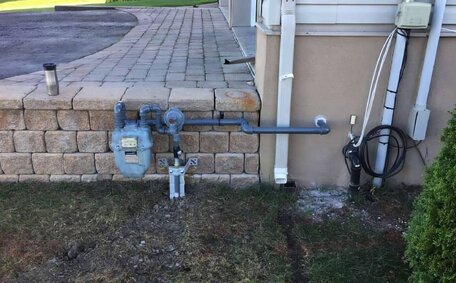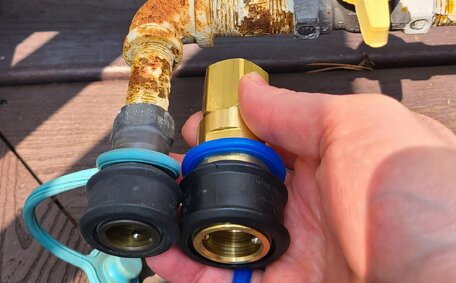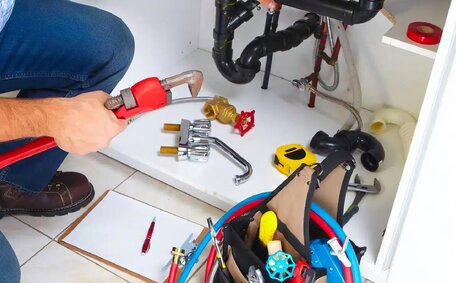Why You Have No Hot Water
Not having access to hot water can be extremely inconvenient and disruptive for any household. Several factors could cause the sudden loss of hot water in your home.
Common culprits range from electrical issues such as faulty circuit breakers or fuses, to gas supply or pilot light troubles in gas water heaters, sediment build-up, leaks, and defective pressure relief valves.
Typically, gas water heaters have a lifespan of 8-12 years; your system’s age may contribute to the lack of hot water.
Quickly resolving a lack of hot water is vital due to its impact on health, hygiene, and routine activities. Do-it-yourself troubleshooting steps can resolve some basic problems, but if these don’t restore hot water, professional assistance from a licenced plumber or electrician is needed.
Immediate Steps When Hot Water Stops
If you suddenly lose hot water, there are a few key things to check right away:
- Check the power supply. Look for any tripped breakers in the fuse box that are connected to the water heater and reset them. Also, make sure that the plug to the water heater (if electric) is securely inserted into the wall outlet.
- For gas water heaters, verify the pilot light’s status and relight according to the manufacturer’s instructions, if necessary. Most gas heaters have an ignition button or knob to facilitate relighting the pilot.
- Shut off your heater’s cold water supply valve, then open a hot tap to depressurise the system and expel cool water.
- Visually inspect the water heater to check for any water leak issues, corrosion, or other damage. Note any issues to report to the plumber.
- If there no leaks, corrosion, pilot light or electrical issues found, it may be sediment buildup or a faulty control board/thermostat that is interrupting water heating. Have a plumber evaluate it further.
Some issues might be fixed with DIY methods, but avoid attempting any service or repairs beyond these initial checks. If hot water is not restored, or If you smell a gas leak or see danger signs like sparks or smoke, turn off hot water and everything else, then call a professional emergency plumber immediately.
Checking Faucets
An effective way to help determine where the hot water issue originates is to check and see the hot water flow from multiple faucets throughout your water systems at home.
- Begin by turning on the faucet nearest to your water heater to the hottest setting.
- Then check the temperature of the water coming from faucets progressively further away from the heater, such as the kitchen sink, bathroom sink, shower and bathtub faucets.
- Determine if issues with hot water are confined to certain faucets, which suggests a localised problem. This indicates a localised problem with that particular faucet rather than a no hot water your system failure.
- Check that each faucet is turned on fully hot. Partial water flow can blend hot and cold water, resulting in lukewarm rather than water coming out hot.
Testing faucets systematically helps identify if the problem is system-wide or specific to individual taps. This assists the plumber in diagnosing the underlying hot water your system’s cause.
Checking Electrical Components
Fuses for the water heater are usually labelled accordingly or situated near circuit breakers marked "Water Heater" or "WH". If you find a tripped fuse, turn off the fuse completely and replace it with a new fuse of the same amperage.
Check if any fuses related to the water heater have tripped. It’s important to thoroughly inspect the electrical components that power your water system. Start by locating the fuse box, typically found in your laundry room, garage or basement.
Inspect for any circuit breakers switched to the "Off" position. Turn these fully "Off" then back to the "On" position.
Inspect your circuit box on your electric water heater for signs of loose, damaged, or burnt wires. Tighten any loose connections and have an electrician replace damaged wires. Burnt connections indicate an issue that a professional can fix, such as the need to replace the thermostat or heating elements.
If no electrical issues are found, the problem likely lies elsewhere with the water heating system itself. Should you discover signs of damaged wiring, sparks, or smoke, switch off the main power and promptly contact an emergency electrician.
Common Hot Water System Issues
Some common issues that can cause hot water system failure include:
- Faulty thermostat - If the thermostat malfunctions, it will not signal for the heating elements to heat the water in an electric system or for the pilot light/burner to ignite and sustain heating in a gas system. Key signs are flashing error codes or failure of the unit to ignite when the power/gas supply is on.
- Sediment buildup - Mineral accumulation inside the tank blocks heat transfer and inhibits water flow. Flushing the tank yearly helps prevent sediment buildup.
- Leaks - External leaks may drain the tank, and internal leaks can lead to heating loss, thus impairing hot water provision. Check for visible water puddles around the system.
- Pressure problems - Inadequate water pressure prevents sufficient water flow to properly heat up the water. Conversely, excessively high pressure impedes safe heating capacity. Check the pressure relief valve. Annual servicing helps ensure proper operating pressure.
Gas Water Heater Problems
Gas water heaters can develop issues specific to their fuel type and igniting components. Specific problems affecting gas water heaters involve:
- Pilot light malfunction - If the pilot light goes out and fails to relight when the igniter button is pressed, the thermocouple likely needs replacement.
- Gas valve failure - Faulty gas valves prevent gas flowing to the pilot light. Replacing old, sticking gas valves remedies this.
- Insufficient gas flow - Inadequate gas pressure going to the water heater will result in the pilot failing to ignite or weak water heating. Checking exterior gas lines and contacting the gas company can help diagnose flow problems.
- Vent blockage - Blocked vents prevent exhaust gases from exiting the flue. This causes the unit to overheat and disables hot water heating as a safety precaution. Have a plumber inspect and clear the flue.
Should your gas water heater fail to produce hot water with a stable gas supply and power, call a professional plumber without delay. Attempting DIY fixes on a malfunctioning gas appliance risks safety hazards.
Electric Water Heater Problems
Electric water heaters can encounter various problems that interrupt home hot water supply:
- Power disruptions – Loss of electricity, tripped breakers, or blown fuses can cut power to electric heating elements
- Faulty thermostats – Defective or incorrectly set thermostats fail to signal heating elements to heat water to the desired temperature
- High temp cutoff – If the water overheats due to thermostat problems, this safety device cuts power to prevent dangerously hot water
Checking electrical connections and the thermostat panel for correct temperature settings or error codes is vital for diagnosing electric water heater issues. However, to get your hot water functioning, repairs to electrical components should only be performed by a licenced professional as safety risks exist.
Call a plumber immediately if your electric water heater doesn’t heat water despite an active power supply.
General Water Heater Problems
Issues common to both tank and tankless water heaters include:
- Corrosion and leaks - Mineral deposits combined with water and air can corrode the tank’s interior. This leads to leaks and loss of efficiency.
- Sediment buildup – Hard water deposits accumulate at the bottom of the tank, interfering with heat transfer to the water supply.
- Heating element failure – Electric heating elements eventually degrade over time. Burnt out or cracked elements prevent water heating.
Annual water tank flushing and replacing heating elements every 5-8 years are preventative measures that can help mitigate these general issues. Seeking prompt water service repairs as problems emerge also reduces risk of complete system failure.
When to Call a Professional
While some hot water system issues can potentially be addressed through DIY troubleshooting, there are certain scenarios that require professional assistance.
It is advisable to call Marsfield Plumbing right away if you:
- Detect leaks either inside the tank or externally
- Notice signs of smoke, strange sounds, or odd smells coming from the water heater
- Have an older system that needs complete replacement
- Find that repeated manual relighting of the pilot light is needed in a gas heater
If hot water is not restored within 24 hours after inspecting all electrical connections and the gas supply, enlist our professional service.
In such cases, give us call at Marsfield Plumbing promptly through phone on 1300 349 338 or email at jobs@marsfieldplumbingservices.com.au. Our expert technicians can accurately diagnose the fault and take steps to restore your hot water supply.
Plumbing vs Electrical Expertise
Both plumbers and electricians play important roles when hot water supply fails in your homes. Electricians deal with all the needs for electrical problems like circuit breakers, fuses, thermostat wiring, and heating elements.
Plumbers typically manage issues with the water heater, its plumbing components—including valves, gas lines, sediment build-up, blocked drains, and leaks.
Issues such as gas supply line faults, valve malfunctions, vent obstructions, pilot light failures, or gas heater tank leaks necessitate contacting a professional plumber. For problems with electrical components like damaged wires, tripped breakers, blown fuses, or heating element failure in gas hot heaters, licenced electricians are required.
When the cause is unclear, plumbers and electricians may collaborate to identify the root problem disrupting the hot water supply. It is best to request service from both trades if troubleshooting steps have been exhausted and issues persist across gas and electric systems in the home.
No Hot Water is an Emergency Repair
Under the Australian Residential Tenancies Agreement (RTA), no access to hot water is considered an emergency. The RTA defines an 'emergency water your repair’ as any fault or damage that causes the premises to become unsafe, not secure, or that makes it impossible for the tenant to live there comfortably.
Given hot water’s necessity for hygiene, cooking, and cleaning, the RTA mandates that landlords and property agents respond promptly within 24 hours to any hot water outage reports. The maximum reasonable time limit for completion of full repairs is 48 hours.
If after 24 hours and all DIY troubleshooting efforts you still have no hot water, Contact Marsfield Plumbing right away.
Delays prolong discomfort and pose health risks while also exacerbating existing problems. It is critical that hot water supply issues are addressed rapidly through an emergency plumber callout. We can quickly diagnose the issue and complete urgent repairs to restore your vital hot water supply.
From Quick Fixes to Replacement
In many cases, a lack of hot water can be temporarily resolved through basic troubleshooting steps like resetting a tripped circuit breaker or relighting the pilot light on a gas water heater.
However, if you find yourself needing to constantly relight the pilot or the electric hot water supply is only restored for short periods, it’s time to call a professional for repairs.
Consider your system’s age and breakdown frequency when evaluating water heater issues. Water heaters typically last 8-12 years, so if your unit exceeds this age range you may want to weigh the costs of continued repair against replacement with a new hot, more energy efficient model.
No matter what point you’re at with hot water loss in your home, give us a ring at Marsfield Plumbing – we Possess the necessary experience and expertise to swiftly restore your hot water supply. It’s time to call us at 1300 349 338 or email jobs@marsfieldplumbingservices.com.au for emergency breakdown service, repairs on faulty components, full water heater replacement, or upgrades to more sustainable tankless systems.
Our team is on standby to assess any issues with your hot water supply and take swift, tailored action.






